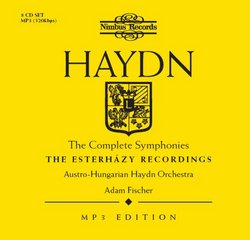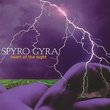| All Artists: Austro-Hungarian Haydn Orch, Fischer Title: Complete Symphonies - MP3 Edition Members Wishing: 0 Total Copies: 0 Label: Nimbus Records Original Release Date: 1/1/2009 Re-Release Date: 6/9/2009 Album Type: Box set, Import Genre: Classical Style: Symphonies Number of Discs: 8 SwapaCD Credits: 8 UPCs: 0710357172229, 710357172229 |
Search - Austro-Hungarian Haydn Orch, Fischer :: Complete Symphonies - MP3 Edition
 | Austro-Hungarian Haydn Orch, Fischer Complete Symphonies - MP3 Edition Genre: Classical Ultra-value eight-disc MP3 box set! Customers will be able to transfer the files directly to iPod or MP3 player, and play the discs on computers, most DVD players, and the latest generation of in-car players. Celebrating t... more » |
Larger Image |
CD DetailsSynopsis
Album Description Ultra-value eight-disc MP3 box set! Customers will be able to transfer the files directly to iPod or MP3 player, and play the discs on computers, most DVD players, and the latest generation of in-car players. Celebrating the bicentennial of Joseph Haydn's death, Nimbus is planning a yearlong campaign for the existing box sets, plus this MP3 set containing the complete symphonies. The new set will be released in MP3 format at 320 kbps. No other set features so much in-depth detail for such a great price! Includes a comprehensive analysis on the Symphonies and an article on the making of the recordings, with an overview of the project from conductor Adam Fisher. "This complete symphonies set--an MP3 edition that you load to your computer or iPod--is an incredible bargain ... [Adam Fischer] delivers powerful performances." -- Gramophone Reissue of the Month Not playable on all CD players Similarly Requested CDs
|
CD ReviewsThe Haydn Symphonies: a technical view Tony the Engishman | Titusville, FL USA | 06/29/2009 (5 out of 5 stars) "I have purchased this eight-disc set from Amazon, and I was persuaded to do so, first, by reading the reviews of the same recordings in the 33-disc set described in this section of Amazon. I am not qualified to discourse on the quality of classical music as such, but I do enjoy it. Having recently purchased an iPod which can hold 120 GB of material, I have taken the opportunity to convert my entire collection of about 250 CDs, both classical and popular, into mp3 format, creating a properly indexed library on this machine. I had collected about 20 of Haydn's symphonies from different sources and thought it would be good to have all of them. So I was most impressed to see this set on only 8 CDs for only $34 instead of $120 for the 33-disc set. The difference is accounted for by the fact that the 8-disc set actually contains on 8 CD plastic discs every track in compressed mp3 format. This is a set specifically designed for people who have the media to play mp3 format music. This was my second reason for buying this set. So I thought it might be useful to review this set for what it is technically: the quality of the music has been addressed by others. And technically, the quality is good. There is far too much material to consider downloading separate tracks: putting them all on disc is the only way to do it, in my opinion. I am writing to inform iPod owners as to the benefits and the pitfalls of receiving these CDs in mp3 format instead of full `CDA' (or `WAV') format. The greatest benefit is of course to have all that great music at all, and such an incredibly cheap price. But, be warned. The software associated with iPods is called iTunes. If you use your computer to import a "normal" CD to iTunes, preparatory to placing it on your iPod, iTunes will in the vast majority of cases be able to consult online with a massive database of nearly all published recordings in CD format. It will provide you, track by track, with the information you might wish to have, including key signatures, tempi, artist names and album names. But iTunes cannot recognize discs in mp3 format as it is not currently set up to do this. So the information about each track is very minimal. A brochure is included with the set which describes each track in detail. If you want such details in iTunes, and thus on your iPod, you will have to spend some time typing the material in yourself. Actually, that is not a bad way to find out what is on these discs, but it is definitely a chore. One very great benefit which may or may not be contained on the full 33-disc set is the inclusion on the eighth disc of a PDF document which discourses widely on the symphonies and also has essays on "Haydn and London", and "The story of the Nimbus Haydn Cycle 1987-2001". I have printed this off and it is a very considerable summary which goes far beyond printed offerings which sometimes accompany CDs. As to the quality of compressed mp3 sound, iPod users will in general be using headphones and not large speaker systems. At a bit-rate of 320 kbps, I cannot imagine that any quality will be noticed by the ordinary listener. Personally, I have never been able to distinguish the loss caused by mp3 compression, notwithstanding the full compact disc format is at 44.1 kbps. I have converted all my other CDs at 128 kbps and the results are fine. " Laudable Nimbus Project Joseph L. Ponessa | Glendive MT USA | 12/10/2009 (5 out of 5 stars) "In Germany a couple of companies have released MP3 collections of things like all the symphonies of Mozart or Beethoven on one CD, all the piano sonatas of Beethoven on two CDs, etc. This collection of all of Haydn's symphonies on eight MP3-CDs belongs to that family of releases, and exceeds any of the others in quantity and (I think) quality, pushing the MP3 format to its limits for sound fidelity. Anyone who wants to transfer these symphonies to iPod would be well advised to get this set of discs instead of working from the CDs. The CD sampling rate of 44.1 kHz is exceeded by the MP3 of 48 kHz, and the bit-rates are also favorable. So you can't get from there to here without help from the record company. I already have this Haydn cycle on RBCD (in the Haydn Edition box set) and am very fond of it. The thing I like most about the CDs is the excellent separation of the various instrumental sections, to highlight Haydn's brilliant orchestration. The horns really stand out from the strings, etc. Unfortunately, this MP3 transfer blends the parts together. The result is more symphonic and less "concertante." This must result either from the MP3 process itself, or from a remix off the master tapes by the Nimbus engineers. Though I prefer the CD, the MP3 is not lacking in musicality. I compared them on my Pioneer Elite Universal player, and found both to have pleasing sound contours. It is impossible to say, without hearing the masters, which of them is more faithful to the original. Both of these are lossy formats, and so neither of them is a definitive pressing of this material. It would be nice if Nimbus would make a transfer to a high-resolution format--they released some excellent DVD-Audio titles in their Surround Yourself With series. Perhaps they should take a look at what Naxos is just doing now, releasing all of Haydn's solo piano pieces (normally 10/13 CDs) in multi-channel on three Blu-Ray discs. I don't favor DTS-HD or TrueHD over other high resolution formats (in fact high bitrate DVDA is my format of choice), but the Blu-Ray storage capacity would be ideal for big sets like this one. I would gladly buy this set a third time to hear a more faithful rendition of the tape masters. Thanks, Nimbus, for a very interesting MP3 set." Understanding CD-Audio format versus MP3 format Desert Punk | Tucson, AZ USA | 04/02/2010 (3 out of 5 stars) "I felt prompted to write this comment because of the last two sentences in the "Tony the Englishman" review of this set. When a digital recording is made for CD audio, the sound produced is sampled 44,100 times per second in order to approximate the analog wave-form generated by the sound being recorded. This sample rate, which was a compromise made at the time the CD format was developed, has nothing to do with the compression of the MP3 format, which is a lossy format. Lossy means that when a file is created, some of the data in the CD audio is lost. There are lossless formats [WAV is the uncompressed format] which compress the data without losing any of the original data [such as FLAC and 'Apple Lossless Format']. The compression of MP3 files is based on kilobits per second, such that a file at 128 kbps is more compressed than 192 kbps or 320 kbps. The latter value is the closest to the original audio possible with the MP3 format, but some data is lost nevertheless.
An MP3 made at 128 kbps can never sound as good as one at 192 kbps. Although, many individuals cannot tell the difference between CD audio and an MP3 created at 192 kbps, anyone who considers him/herself an audiophile will tell you that they can hear the difference, especially with a good pair of stereo speakers or earphones. An audiophile will be able to hear the difference between MP3s encoded at 192 and 320 kbps. Finally, though one may not be able to 'hear' the difference between CD audio, a lossless file format and MP3's encoded at 320 kbps, it is generally accepted that a difference in the warmth and excitement of music can be felt. So, anyone who cares enough about their music to collect all of the Haydn symphonies, will want to put music on their iPod or other personal stereo device as lossless files ripped from CD audio [the 33 disc set] or at least as MP3 files encoded at the highest bitrate possible. This means your device will have fewer music files, because the files will take up more physical space on hard drives or in flash memory, but that's why most of us keep our music on a desktop or laptop [or external hard drives hooked up to one]. With an Iomega Prestige 2 TB hard drive presently selling on Amazon.com for about $130 [US], it is simple to trade music files in and out of your iPod playlist using iTunes." |








